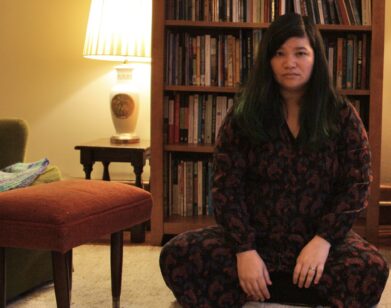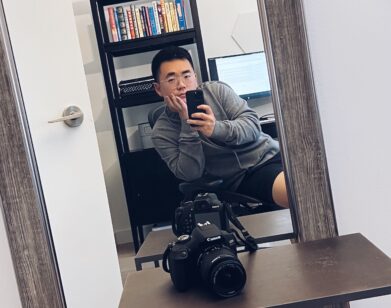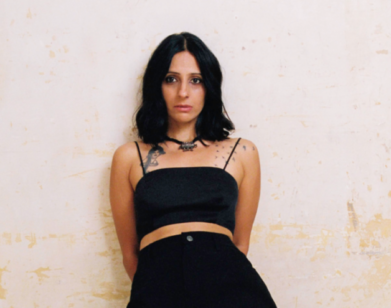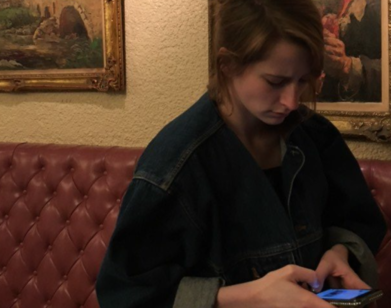literature
Author Rumaan Alam on Why Doomsday Prep is Rather Useless
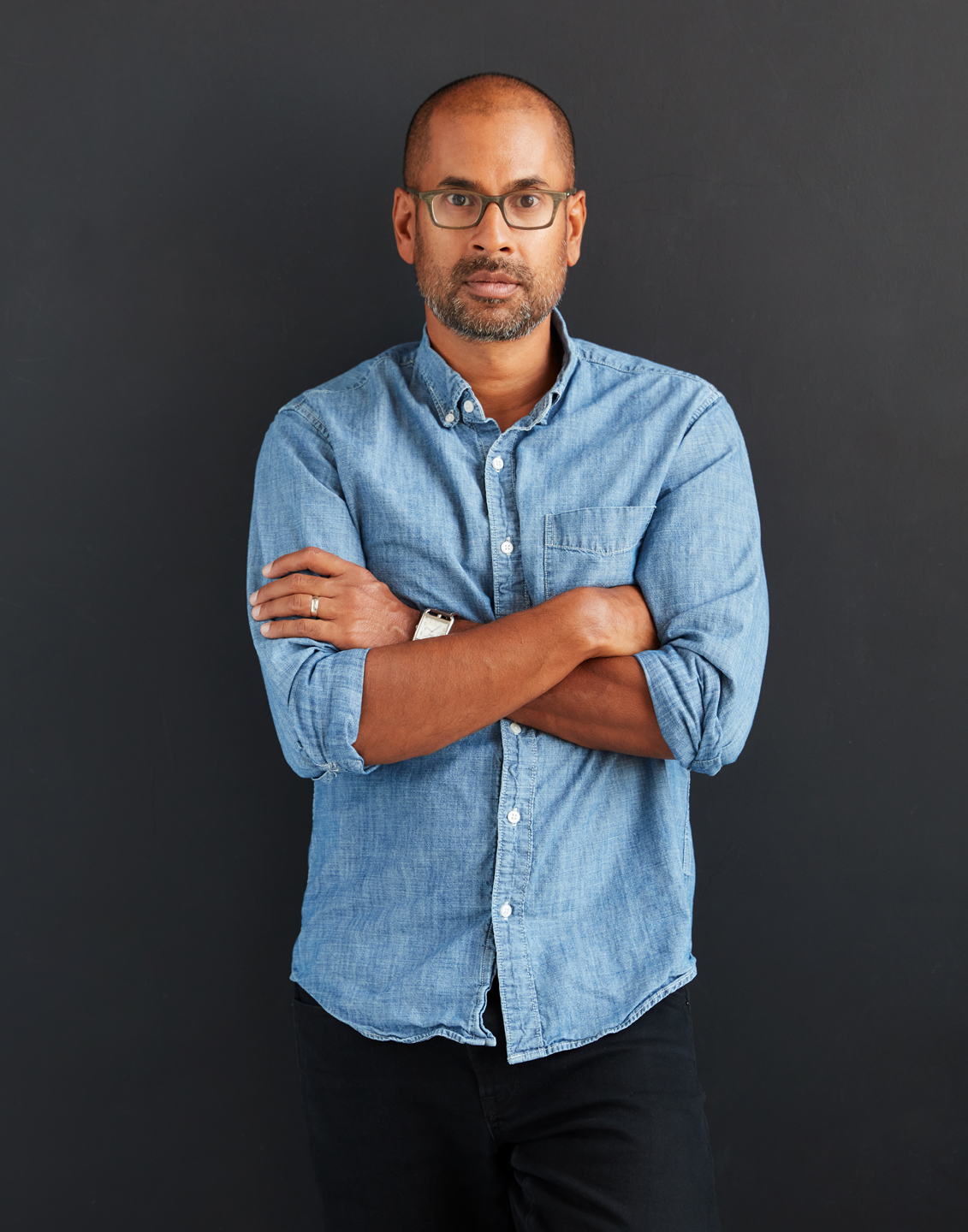
Photo by David A. Land.
Is it the end of the world? Or a regional blackout? A hurricane? An atomic bomb laced with nerve gas? The planet finally exacting its revenge for centuries of abuse? Or maybe it’s just a temporary glitch in a satellite overhead? Rumaan Alam’s ravishing, ravaging new novel Leave the World Behind starts out with calmly enough, with an upper-middle-class white family (wife, husband, older teenage son, younger teenage daughter) from New York City Airbnb-ing a gorgeous country house tucked in the woods on the southern tip of Long Island. Alam is such a gifted writer, with an uncanny ear for the ironies, fantasies, and trivialities that make up modern family life, he could have paused the plot right there and built a terrific novel out of his wry observations. But Leave the World Behind never stops throwing curveballs—and fire balls, asteroids, wild flamingos, pretty much everything. In the dead of night, the vacation is interrupted by a knock on the front door from an older Black couple who claim to be the owners of the house. A blackout has driven them out of Manhattan and back to the safety of their country manse. But the upstairs-downstairs, renters-versus-owners set up is only the beginning of the nightmare, and Alam magnificently turns up the anxiety and paranoia page by page as the world beyond the house’s tree line seems to be undergoing an unknown apocalyptic crisis. Or maybe it’s just that no one can get a decent phone signal? Much has been made of Alam’s prescience in writing a domestic cataclysm novel in light of this year’s trapped-at-home global pandemic. But Leave the World Behind isn’t only the novel of 2020, it’s so alive and intelligent and awake to the world we’ve built for ourselves, and over which we falsely believe we have control, that it feels more like one of the defining novels of our era. I spoke to Alam on Zoom in our separate corners of New York City a week before his third novel was published. At least we hoped there would be a next week. As we’ve all learned too well, anything, literally anything, can happen in the span of a few days.
———
CHRISTOPHER BOLLEN: Can you see these boxes behind me? It’s my entire library. I just moved into a new apartment on the Upper West Side. Where do you live?
RUMAAN ALAM: We’re in Lefferts Gardens in Brooklyn, which is not far from Prospect Park. We have lived here for so long that I sometimes fantasize about moving. But if you were here, you would see that we have so much shit in this house. I feel like we can never move, like we’re hoarders.
BOLLEN: I’ve lived in New York for 24 years and I feel like I’ve moved apartments 20 times.
ALAM: I’ve had this weird inverse experience where I’ve lived in New York since 1999, and I’ve only lived in two places. I hung onto my first apartment for so long. We lived in Fort Greene and I loved it so much but we had a baby so we needed more space and we moved here in 2010. So it’s been a decade, which is crazy to me. I mean, the books alone. I’ll show you the pile of books in the corner of my office. It’s going to fall on me and kill me someday.
BOLLEN: You’re at your desk in your study. Am I looking at the place where you wrote Leave the World Behind?
ALAM: Well, no. I mostly wrote that book in hotel rooms. The idea for the book actually came when I was staying in [the author] Laura Lippman’s apartment for a week up by you. It was the dead of winter and absolutely freezing once you walked out on Riverside Drive. Every time I went outside—which was not often—it was so cold that I found myself fantasizing about summer vacation. I was remembering the vacation my husband and I had taken the previous summer on Long Island. And that’s where it started. My husband travels for work a lot so he had all these Hilton points. I know when I told you I wrote in hotel rooms it sounded like I was staying at the Carlyle and ordering martinis from room service while writing in bed. But that is not what I’m describing. I stayed in a Hilton Express in Times Square for six days.
BOLLEN: That almost sounds rough.
ALAM: I would go where the points would take me the furthest, where I could stay the longest for free. I stayed in the Hilton in downtown Brooklyn twice for six days, too. But basically the first time I went to a hotel room, I wrote half the book in a six-day period. I knew what I was doing. I knew exactly what it was, and I knew that I couldn’t do it at home because I have kids. So the draft fell out of me in those places, and the revision mostly happened here at home. Although I did go back to another hotel in the fall to polish it. I can work in these very concentrated bursts in a way that suited this particular book because it takes place over such a short period of time. Once I would wade into it, I would stay inside of it.
BOLLEN: The voice of the book—this gonzo, semi-omniscient third-person narrator—is so consistent, but what I really admired was how you broke so many rules on what you’re supposed to do in literary fiction. You jump from one character’s head to another and to another, sometimes in the same paragraph. Where there should be declarative statements, you turn them into questions. Ands become ors. Nothing in this world you build seems set in concrete. It really amps up the anxiety to such perfect effect. Did you feel you were taking big risks?
ALAM: Yes, I did. I would say there is always an element of risk in play. But the received ideas and the conventional wisdom about writing is very open to interpretation. I agree with your sense that it violates some of the rules you might be told about how a book ought to work. Especially right now, where the mode of the literary novel is this subjective very close third person, so much so that it feels like a first person because it’s so close to the psychology of the single character or characters. But the strategy of this book, which is a godlike omniscience, is comparatively old-fashioned. It’s almost Victorian compared to the style that’s popular now.
BOLLEN: Obviously, this book captures all of the paranoia and terror and hell of 2020 with such startling accuracy. But you started writing this book in 2018, and that makes me think, every year now is one just filled with madness and chaos. I am sure this book will perfectly capture whatever hell awaits us in 2021, too. So I want to ask the opposite of what most people might—do you think this book speaks to a reality beyond this crazy year of 2020.
ALAM: I do. It’s pure coincidence that I’m writing about people trapped inside of a home. That particular resonance is unexpected. That said, as you point out, a feeling that things have gone off the rails has been with us for a long time. It’s not a new feeling, it’s actually the contemporary feeling. I’d argue it’s been that feeling for almost two decades now. It feels like a millennial feeling. So to see it only in the context of contemporary politics or the current moment of coronavirus or the Trump administration is understandable because that’s the context we occupy. But the challenge is to remember that the context is actually broader than that. The challenge to myself was to write a novel that looked like a domestic novel with a very direct political implication. I think most domestic novels have a political implication, but I wanted to elevate it beyond the sphere of the home into the global level. To me, the defining issue of contemporary existence is the climate. It was really about the desire to write about that. But I couldn’t distill it down to that without also talking about politics or war or all of the intersecting concerns around climate. In the end, I think maybe the book is more effective in that it’s not talking about any one particular thing. It’s talking about a general cultural feeling. I hope the reader will be able to put into it her own particular anxieties, her own hobbyhorse, what she determines is the defining political idea of the moment. If that’s race, there is something to hold onto in this book. If it’s class, there is something to hold onto. If it’s the climate, there’s something to hold onto. The general fabric of unease is what the book is getting at. It’s a choose-your-own-adventure basically. Choose your own issue.
BOLLEN: I’ve been trying to think of apocalyptic novels that feel like this, and I’ve come up pretty empty. Were there any books that you read while writing this one?
ALAM: It’s not a genre I read a ton of. I read Severance [by Ling Ma] after I finished this book. I read Station Eleven [by Emily St. John Mandel] last month for the first time. I think those two books are sort of exemplars of that form, at least in the literary space. But the genre that the book is having most fun with is the literary novel itself, which is its own genre even though we pretend that it’s not. It’s as codified as the apocalypse novel or the horror novel or the romance novel. There are as many conventions and codes with respect to the literary novel, and I had great fun deploying all of them to talk about class or professional anxiety. I mean, early in the book the husband gets a sexual feeling from the dishwasher. And that’s because people of a certain class, of which I am a part, can have a particularly profound feeling about an efficient German dishwasher, and they can feel really moved by the opportunity to possess one for a week in an Airbnb. That’s hilarious to me.
BOLLEN: I’ve spent a lot of time on Eastern Long Island, where your book is set. How important was that as a locale to you? This book is about a global meltdown, and yet I caught the regional cues of the area—the turkeys and little sheds selling eggs, the hand-painted corn signs, the ticks. Were you beholden to Long Island details even though the whole world is blowing up?
ALAM: I wasn’t, because the book is already so outside of reality. This is a real place that we stayed, but the house where we stayed was more modest than the house I describe. It’s not on Airbnb anymore which is too bad because it was such a beautiful place and we had such a beautiful vacation there. But that’s the joy of writing fiction: you get to revise reality. You get to change things to suit your needs. Like the house where we stayed, I could see other houses. But I was able to lift them off of the map and throw them away, and then it began to seem more and more real to me. And it is possible to drive between East Hampton and Sag Harbor and end up on some windy road and be like, “Oh where the fuck am I? I don’t have any cell service and my GPS is out and I don’t actually know where I am.” But then you drive five minutes more and you figure out where you are. You sort of relocate yourself. But it is still possible to get lost in the world. It’s still possible to be out beyond the reaches of technology and it is possible and it’s kind of remarkable that you can do that an hour and a half outside of New York City.
BOLLEN: It’s a shame that the house is off the Airbnb market. It could bill itself as the Leave The World Behind house.
ALAM: I know. And because it’s not listed anymore, I can’t actually get in touch with the owners. But I think I figured out the mailing address of the house so I may just mail a copy.
BOLLEN: You mentioned earlier that the first draft poured out of you because you knew what you were doing. But did that include the ending? I kept wondering as I was approaching the end, monitoring how many pages were left, as one does with a physical copy, how you were going to resolve things.
ALAM: I knew all along how I wanted the book to end. I knew the ending I was working toward with some specificity. I don’t think the ending will be easy for people. I know there is a readership who is not going to love it. Or at least it’s going to be something people will have to grapple with, right? To me, the book has a register of oddity but is fundamentally trying to depict reality. And the best way I knew to depict reality was to present it as it actually functions, which is to say, “Here is some information, here are many more questions than answers, and there is no particular closure. This is simply the situation.” And the last line of the book explicitly talks about that. The last line of the book has one of the characters saying, “We don’t know what is going to happen, but hasn’t that always been true?” There is a reader who wants a narrative to offer her the comfort of, if not a happy ending, at least a definitive ending. But that doesn’t exist in reality.
BOLLEN: No happy endings, and yet I often wonder, do people want reality in their fiction. It does seem people read books precisely for comfort.
ALAM: I would argue that there is some comfort in the book. I think what the book is suggesting is that comfort is the stuff that happens in the book. How do people survive? How do people go on? What makes life worth it? Is it having sex and eating food and talking to people? I think it kind of is. That’s all we have at our disposal. The book doesn’t try to offer you anything more than that because it would be intellectually dishonest, because what else can you do? What else are we supposed to do as human beings?
BOLLEN: Fill bathtubs with water. Until I read your book, I didn’t even realize that was a survival tactic. But it’s very smart.
ALAM: Yes, fill the bathtub. But, you know, at the beginning of quarantine, so many of us went to the grocery store and bought dry beans or whatever. But then you just eat that food. You just eat the food and then you’re like, “Well, we’re actually no better off. We sustained ourselves for one more week. We’re not prepared.” There is a whole subculture in this country of preppers, people who are waiting for doomsday. But you can’t prepare. That is not how life works. You could be a doomsday prepper and get hit by a truck tomorrow, and a closet full of shotgun shells and Rancho Gordo beans isn’t going to do shit for you. Life doesn’t operate on those terms. Life is something you cannot negotiate with. Nothing will save you, not seclusion or food or sourdough starter.
BOLLEN: We spend so much time wondering how a reader will feel or react to a book, we often forget that the actual writing of a book can put writers in very difficult frames of mind. There is an emotional and physical toll in writing certain material. I wondered if you experienced any of that while working on this book.
ALAM: Writing for me is difficult. It’s a difficult thing to go through as a logistical matter of just getting the words on the page, and then an emotional matter of investing some percentage of your brain into thinking about something that is pretend. If anyone who is not a writer spent a large percentage of their subconscious time thinking about people who don’t exist and scenarios that are not happening, you would call that madness. So you have to enter into this state of kind of controlled madness to inhabit that universe and then get it down into language. That can be an unsettling place to be, even if you’re writing a book that’s happy. Even someone who writes about romance may feel that sense of dissociation from reality because of the work they do professionally. So that is always there. When you’re writing a book that has a darkness to it, as this book does, I think that can compound it.
Look, so I had gone back to this other hotel in downtown Brooklyn right before I turned in the penultimate draft. It was a big revision and I was there for six days. I check into a hotel and it’s three o’clock and I get a cappuccino, go up to the room, unpack everything. The first thing I do is take a shower and put on comfortable clothes. I sit down to write so it’s 3:45 and I get into that zone and write until 9. Then I order Thai food and stay up until midnight and fall asleep in bed and there’s a dirty bag of Thai food on the floor. I remember very specifically I had all the chapters piled up on the bed, and I just went to sleep with this paper all over the bed. I would set the alarm for really early because I work really well very early in the morning. So I sleep from 12 until 4:30 and I get up and I make shitty hotel-room tea and I sit there from 4:30 until 9:00 writing in my bed, surrounded by papers like a crazy person. Like a truly crazy person with this disgusting bag of Thai food on the floor right from the night before. And then I go back to sleep and I sleep from 9 until noon and then I get up and take a shower and open the window and go outside for five minutes so I can feel normal. Then I go right back to the room and I do it again. It’s like a period of being feral. Abandoning any semblance of other responsibility. In that period, I’m not looking at my email, I’m not paying my bills, I’m not dealing with my kids. I call them in the morning to say hi, but that’s it. My husband is doing everything, I am sort of off the grid. It helps me to do that work. I let go of whatever is holding me into reality and go into the world of the book. I won’t even let the housekeeping in.
BOLLEN: Really?
ALAM: No, because I just want to work. I’m confident they thought I was there on some kind of drug binge.
BOLLEN: It sounds exactly like that.
ALAM: I don’t mean to suggest it’s dangerous or scary, but it is a weird place of abandoning reality for a few days. And it’s the only way I was able to write this book. It’s what I needed to do.
BOLLEN: We talked before about what books can and can’t do in providing comfort, but it occurs to me that one character in your book, the little girl, Rose, does carry a book around with her as a kind of protection. And she learns to be adventurous and independent from reading books about little girls being that way, which encourages her to find some kind of way out. So, maybe, there is a lesson about literature teaching us something about ways of survival.
ALAM: I interviewed a curator earlier this spring. She had worked on the Gerhard Richter show, “Painting After All,” which was at the Met Breuer and which had to close the day it opened. No one got to see it. I was talking to the curator about that particular fact. And she said to me that after 9/11, museums saw their visitorship skyrocket. I think that’s so insightful and so telling. In the moment of real cultural crisis, people turn to the thing that sustains them, whether that is books or art or faith. If there is anything that makes life worth soldiering on, it is that, you know?
BOLLEN: That old, trite question, what books would you want with you if you were a castaway on a desert island, is not such a hollow one. It’s asking, what would keep you mentally and emotionally alive? The answer is art. Isn’t there a movie where, right before the apocalypse, the children are finally allowed to touch the paintings? Like, now, yes, you have permission to touch them in the last seconds of Earth. Go ahead.
ALAM: That’s amazing. Did you ever see the movie Children of Men? There is a brief scene at the beginning where you see paintings being put into storage. They’re carrying away masterpieces and the implication is that society is falling apart and they’re going to do something to protect its cultural heritage because it understands that is all you have.
BOLLEN: It’s like a cultural version of the Doomsday Vault in Norway where they’ve stored all the world’s seeds.
ALAM: Exactly. It is the ultimate expression of a civilization, and so it ought to be protected.

